Analyzing Executive Compensation, Ethics, and Governance in Accounting
VerifiedAdded on 2023/06/04
|27
|11105
|52
Report
AI Summary
This report provides an in-depth analysis of executive compensation practices in the US, focusing on the ethical implications and the role of corporate governance. It examines the increasing gap between CEO pay and company performance, the impact of taxation laws, and the effectiveness of shareholder control. The report also discusses the barriers to effective shareholder control, such as business relationships, regulatory restrictions, and information processing limitations. Furthermore, it explores the potential impact of denying contracts to companies with discriminatory employment practices and suggests reforms to ensure fair executive pay based on skills and qualifications, rather than factors leading to unfair discrimination. The document emphasizes the need for a balance between government regulation and shareholder authority to improve executive remuneration governance. Desklib offers students access to a wealth of solved assignments and past papers, aiding in their academic journey.

Accounting Reporting and Professional
Practice
Practice
Paraphrase This Document
Need a fresh take? Get an instant paraphrase of this document with our AI Paraphraser
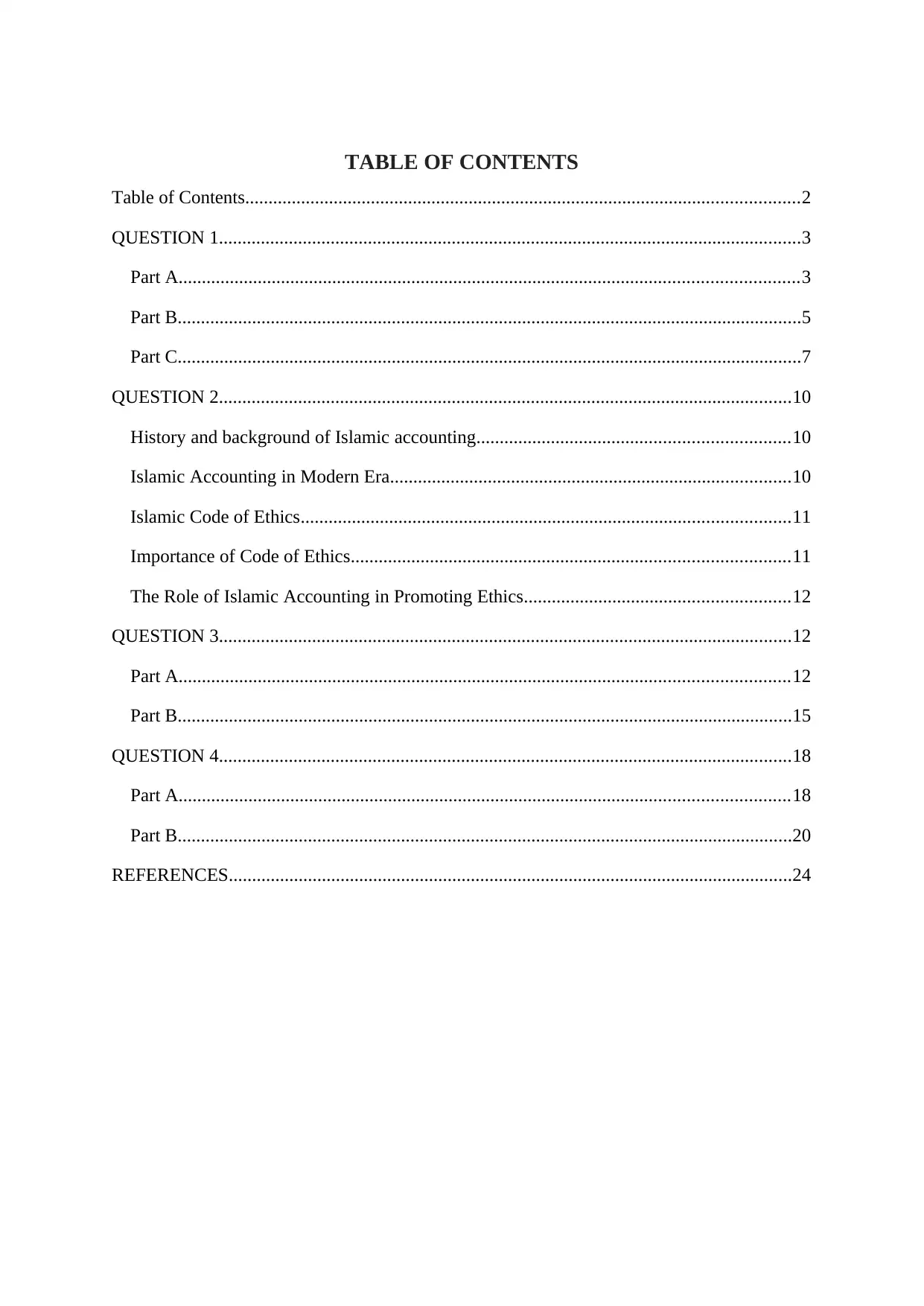
TABLE OF CONTENTS
Table of Contents.......................................................................................................................2
QUESTION 1.............................................................................................................................3
Part A.....................................................................................................................................3
Part B......................................................................................................................................5
Part C......................................................................................................................................7
QUESTION 2...........................................................................................................................10
History and background of Islamic accounting...................................................................10
Islamic Accounting in Modern Era......................................................................................10
Islamic Code of Ethics.........................................................................................................11
Importance of Code of Ethics..............................................................................................11
The Role of Islamic Accounting in Promoting Ethics.........................................................12
QUESTION 3...........................................................................................................................12
Part A...................................................................................................................................12
Part B....................................................................................................................................15
QUESTION 4...........................................................................................................................18
Part A...................................................................................................................................18
Part B....................................................................................................................................20
REFERENCES.........................................................................................................................24
Table of Contents.......................................................................................................................2
QUESTION 1.............................................................................................................................3
Part A.....................................................................................................................................3
Part B......................................................................................................................................5
Part C......................................................................................................................................7
QUESTION 2...........................................................................................................................10
History and background of Islamic accounting...................................................................10
Islamic Accounting in Modern Era......................................................................................10
Islamic Code of Ethics.........................................................................................................11
Importance of Code of Ethics..............................................................................................11
The Role of Islamic Accounting in Promoting Ethics.........................................................12
QUESTION 3...........................................................................................................................12
Part A...................................................................................................................................12
Part B....................................................................................................................................15
QUESTION 4...........................................................................................................................18
Part A...................................................................................................................................18
Part B....................................................................................................................................20
REFERENCES.........................................................................................................................24
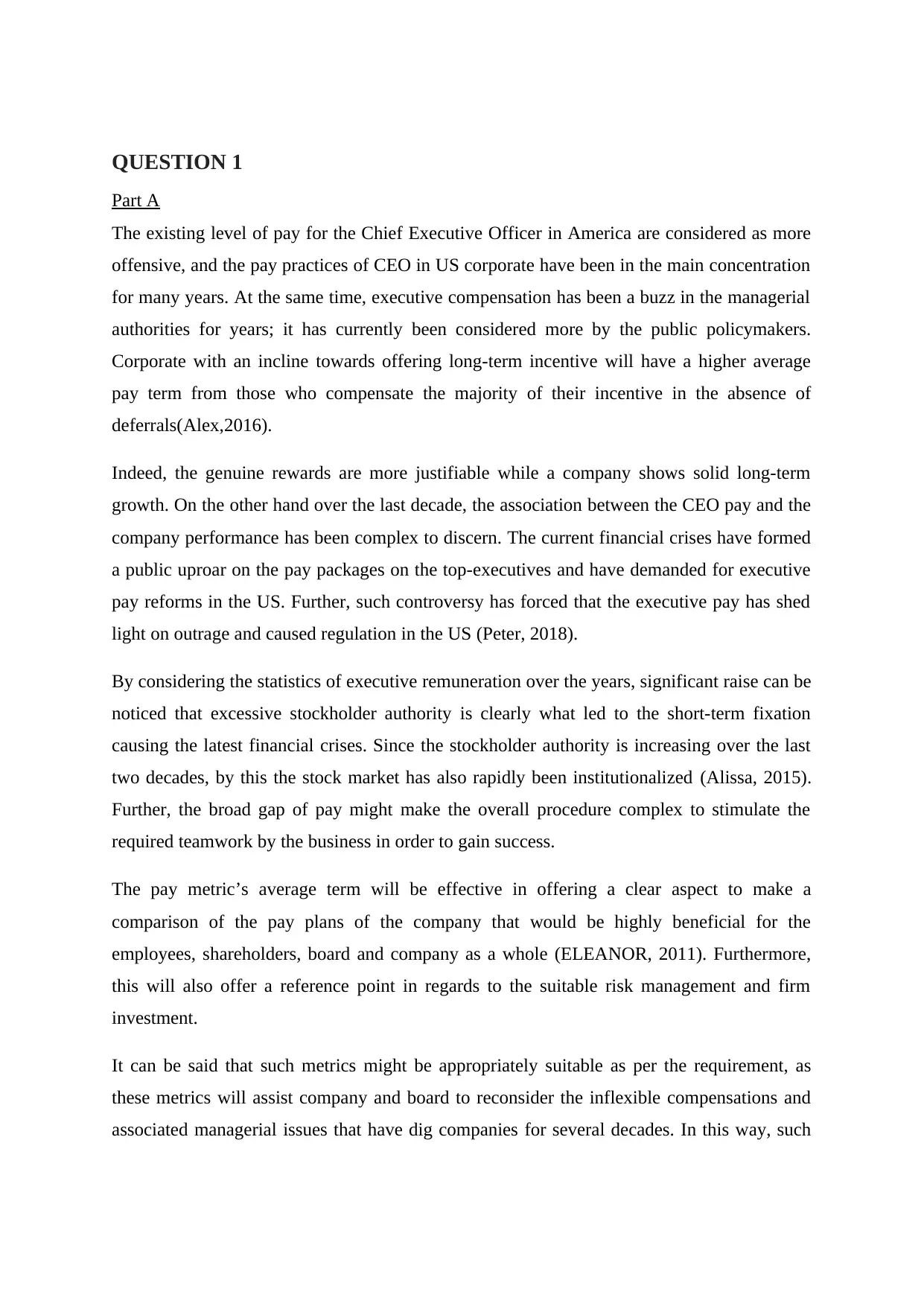
QUESTION 1
Part A
The existing level of pay for the Chief Executive Officer in America are considered as more
offensive, and the pay practices of CEO in US corporate have been in the main concentration
for many years. At the same time, executive compensation has been a buzz in the managerial
authorities for years; it has currently been considered more by the public policymakers.
Corporate with an incline towards offering long-term incentive will have a higher average
pay term from those who compensate the majority of their incentive in the absence of
deferrals(Alex,2016).
Indeed, the genuine rewards are more justifiable while a company shows solid long-term
growth. On the other hand over the last decade, the association between the CEO pay and the
company performance has been complex to discern. The current financial crises have formed
a public uproar on the pay packages on the top-executives and have demanded for executive
pay reforms in the US. Further, such controversy has forced that the executive pay has shed
light on outrage and caused regulation in the US (Peter, 2018).
By considering the statistics of executive remuneration over the years, significant raise can be
noticed that excessive stockholder authority is clearly what led to the short-term fixation
causing the latest financial crises. Since the stockholder authority is increasing over the last
two decades, by this the stock market has also rapidly been institutionalized (Alissa, 2015).
Further, the broad gap of pay might make the overall procedure complex to stimulate the
required teamwork by the business in order to gain success.
The pay metric’s average term will be effective in offering a clear aspect to make a
comparison of the pay plans of the company that would be highly beneficial for the
employees, shareholders, board and company as a whole (ELEANOR, 2011). Furthermore,
this will also offer a reference point in regards to the suitable risk management and firm
investment.
It can be said that such metrics might be appropriately suitable as per the requirement, as
these metrics will assist company and board to reconsider the inflexible compensations and
associated managerial issues that have dig companies for several decades. In this way, such
Part A
The existing level of pay for the Chief Executive Officer in America are considered as more
offensive, and the pay practices of CEO in US corporate have been in the main concentration
for many years. At the same time, executive compensation has been a buzz in the managerial
authorities for years; it has currently been considered more by the public policymakers.
Corporate with an incline towards offering long-term incentive will have a higher average
pay term from those who compensate the majority of their incentive in the absence of
deferrals(Alex,2016).
Indeed, the genuine rewards are more justifiable while a company shows solid long-term
growth. On the other hand over the last decade, the association between the CEO pay and the
company performance has been complex to discern. The current financial crises have formed
a public uproar on the pay packages on the top-executives and have demanded for executive
pay reforms in the US. Further, such controversy has forced that the executive pay has shed
light on outrage and caused regulation in the US (Peter, 2018).
By considering the statistics of executive remuneration over the years, significant raise can be
noticed that excessive stockholder authority is clearly what led to the short-term fixation
causing the latest financial crises. Since the stockholder authority is increasing over the last
two decades, by this the stock market has also rapidly been institutionalized (Alissa, 2015).
Further, the broad gap of pay might make the overall procedure complex to stimulate the
required teamwork by the business in order to gain success.
The pay metric’s average term will be effective in offering a clear aspect to make a
comparison of the pay plans of the company that would be highly beneficial for the
employees, shareholders, board and company as a whole (ELEANOR, 2011). Furthermore,
this will also offer a reference point in regards to the suitable risk management and firm
investment.
It can be said that such metrics might be appropriately suitable as per the requirement, as
these metrics will assist company and board to reconsider the inflexible compensations and
associated managerial issues that have dig companies for several decades. In this way, such
⊘ This is a preview!⊘
Do you want full access?
Subscribe today to unlock all pages.

Trusted by 1+ million students worldwide
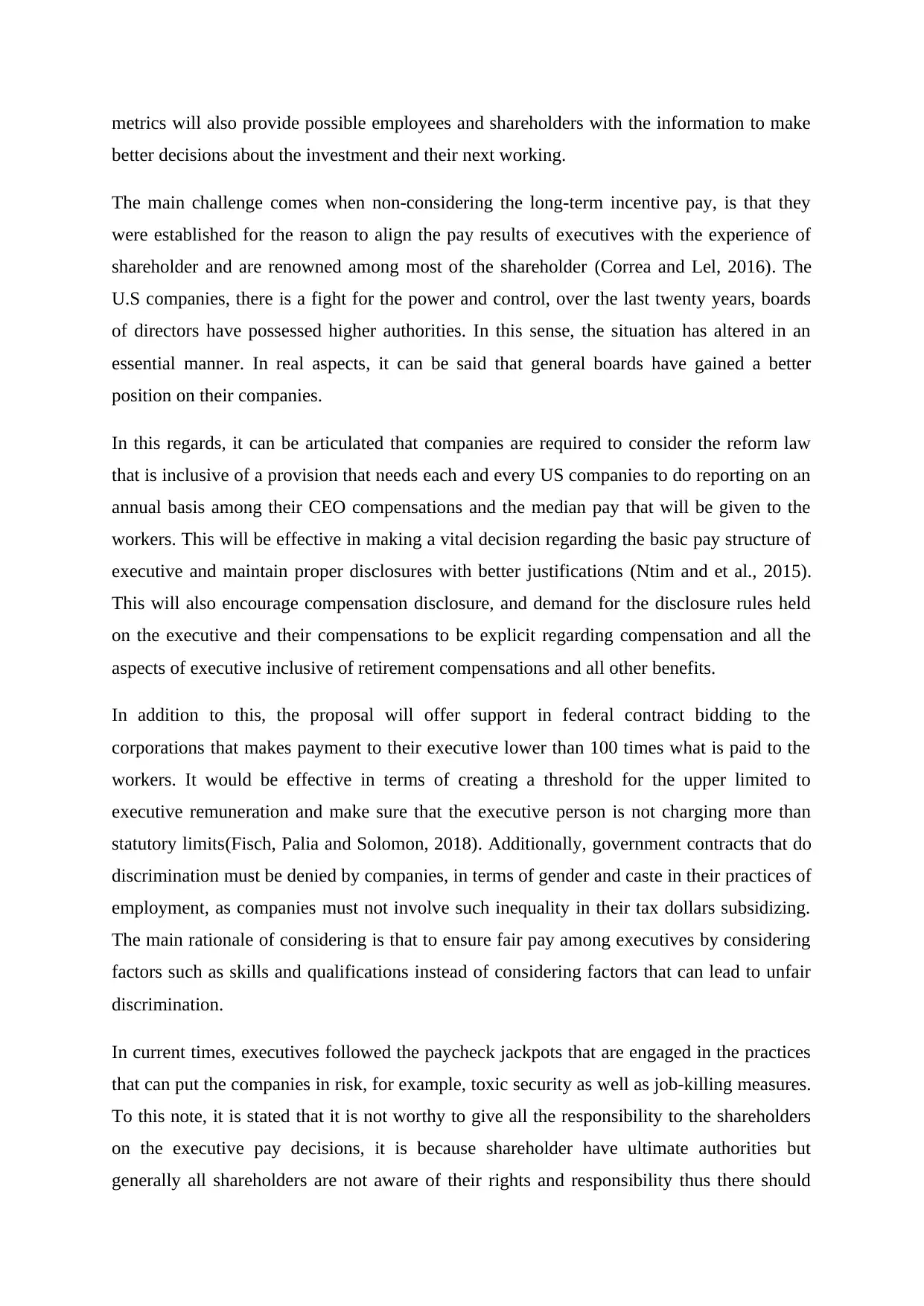
metrics will also provide possible employees and shareholders with the information to make
better decisions about the investment and their next working.
The main challenge comes when non-considering the long-term incentive pay, is that they
were established for the reason to align the pay results of executives with the experience of
shareholder and are renowned among most of the shareholder (Correa and Lel, 2016). The
U.S companies, there is a fight for the power and control, over the last twenty years, boards
of directors have possessed higher authorities. In this sense, the situation has altered in an
essential manner. In real aspects, it can be said that general boards have gained a better
position on their companies.
In this regards, it can be articulated that companies are required to consider the reform law
that is inclusive of a provision that needs each and every US companies to do reporting on an
annual basis among their CEO compensations and the median pay that will be given to the
workers. This will be effective in making a vital decision regarding the basic pay structure of
executive and maintain proper disclosures with better justifications (Ntim and et al., 2015).
This will also encourage compensation disclosure, and demand for the disclosure rules held
on the executive and their compensations to be explicit regarding compensation and all the
aspects of executive inclusive of retirement compensations and all other benefits.
In addition to this, the proposal will offer support in federal contract bidding to the
corporations that makes payment to their executive lower than 100 times what is paid to the
workers. It would be effective in terms of creating a threshold for the upper limited to
executive remuneration and make sure that the executive person is not charging more than
statutory limits(Fisch, Palia and Solomon, 2018). Additionally, government contracts that do
discrimination must be denied by companies, in terms of gender and caste in their practices of
employment, as companies must not involve such inequality in their tax dollars subsidizing.
The main rationale of considering is that to ensure fair pay among executives by considering
factors such as skills and qualifications instead of considering factors that can lead to unfair
discrimination.
In current times, executives followed the paycheck jackpots that are engaged in the practices
that can put the companies in risk, for example, toxic security as well as job-killing measures.
To this note, it is stated that it is not worthy to give all the responsibility to the shareholders
on the executive pay decisions, it is because shareholder have ultimate authorities but
generally all shareholders are not aware of their rights and responsibility thus there should
better decisions about the investment and their next working.
The main challenge comes when non-considering the long-term incentive pay, is that they
were established for the reason to align the pay results of executives with the experience of
shareholder and are renowned among most of the shareholder (Correa and Lel, 2016). The
U.S companies, there is a fight for the power and control, over the last twenty years, boards
of directors have possessed higher authorities. In this sense, the situation has altered in an
essential manner. In real aspects, it can be said that general boards have gained a better
position on their companies.
In this regards, it can be articulated that companies are required to consider the reform law
that is inclusive of a provision that needs each and every US companies to do reporting on an
annual basis among their CEO compensations and the median pay that will be given to the
workers. This will be effective in making a vital decision regarding the basic pay structure of
executive and maintain proper disclosures with better justifications (Ntim and et al., 2015).
This will also encourage compensation disclosure, and demand for the disclosure rules held
on the executive and their compensations to be explicit regarding compensation and all the
aspects of executive inclusive of retirement compensations and all other benefits.
In addition to this, the proposal will offer support in federal contract bidding to the
corporations that makes payment to their executive lower than 100 times what is paid to the
workers. It would be effective in terms of creating a threshold for the upper limited to
executive remuneration and make sure that the executive person is not charging more than
statutory limits(Fisch, Palia and Solomon, 2018). Additionally, government contracts that do
discrimination must be denied by companies, in terms of gender and caste in their practices of
employment, as companies must not involve such inequality in their tax dollars subsidizing.
The main rationale of considering is that to ensure fair pay among executives by considering
factors such as skills and qualifications instead of considering factors that can lead to unfair
discrimination.
In current times, executives followed the paycheck jackpots that are engaged in the practices
that can put the companies in risk, for example, toxic security as well as job-killing measures.
To this note, it is stated that it is not worthy to give all the responsibility to the shareholders
on the executive pay decisions, it is because shareholder have ultimate authorities but
generally all shareholders are not aware of their rights and responsibility thus there should
Paraphrase This Document
Need a fresh take? Get an instant paraphrase of this document with our AI Paraphraser
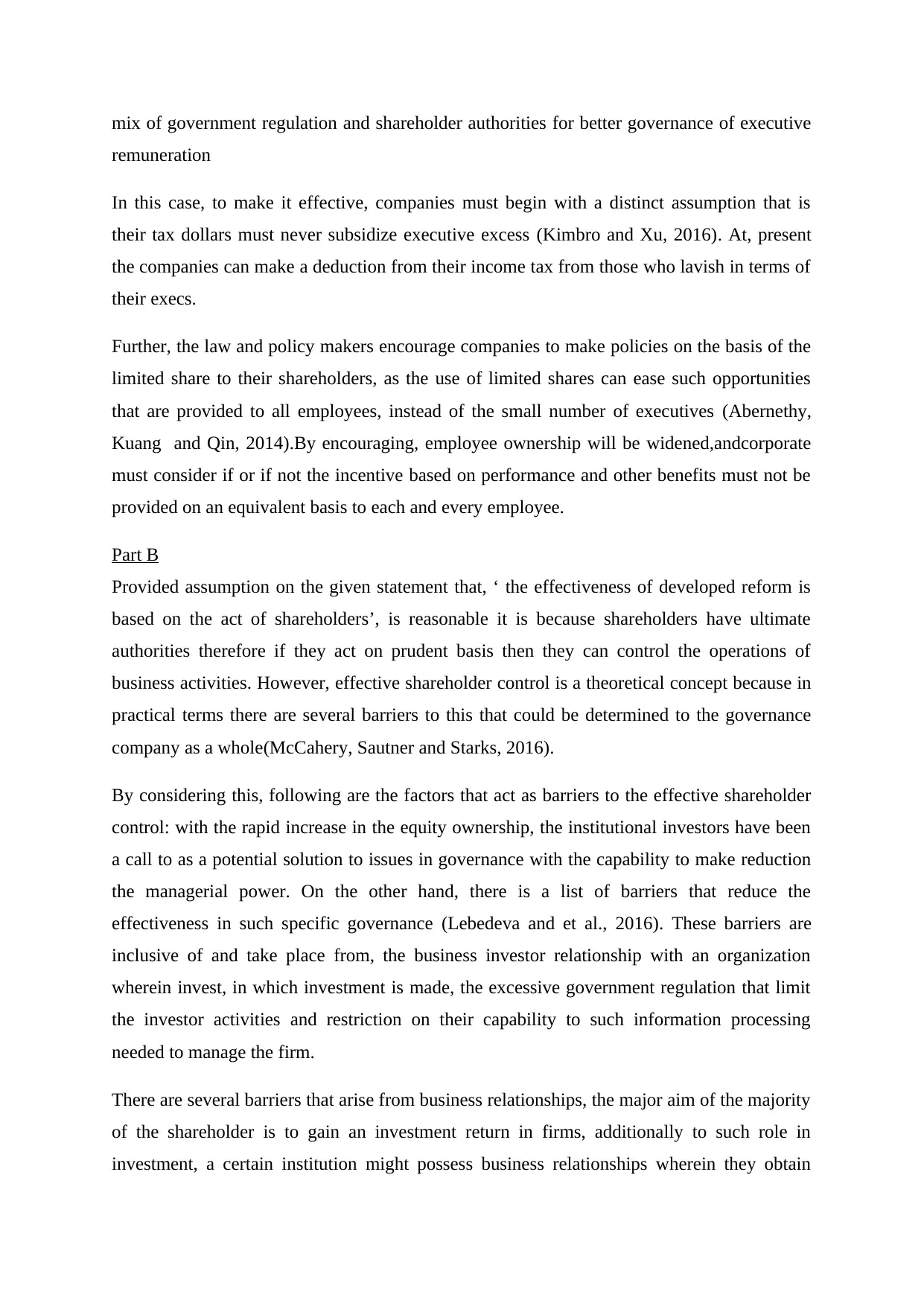
mix of government regulation and shareholder authorities for better governance of executive
remuneration
In this case, to make it effective, companies must begin with a distinct assumption that is
their tax dollars must never subsidize executive excess (Kimbro and Xu, 2016). At, present
the companies can make a deduction from their income tax from those who lavish in terms of
their execs.
Further, the law and policy makers encourage companies to make policies on the basis of the
limited share to their shareholders, as the use of limited shares can ease such opportunities
that are provided to all employees, instead of the small number of executives (Abernethy,
Kuang and Qin, 2014).By encouraging, employee ownership will be widened,andcorporate
must consider if or if not the incentive based on performance and other benefits must not be
provided on an equivalent basis to each and every employee.
Part B
Provided assumption on the given statement that, ‘ the effectiveness of developed reform is
based on the act of shareholders’, is reasonable it is because shareholders have ultimate
authorities therefore if they act on prudent basis then they can control the operations of
business activities. However, effective shareholder control is a theoretical concept because in
practical terms there are several barriers to this that could be determined to the governance
company as a whole(McCahery, Sautner and Starks, 2016).
By considering this, following are the factors that act as barriers to the effective shareholder
control: with the rapid increase in the equity ownership, the institutional investors have been
a call to as a potential solution to issues in governance with the capability to make reduction
the managerial power. On the other hand, there is a list of barriers that reduce the
effectiveness in such specific governance (Lebedeva and et al., 2016). These barriers are
inclusive of and take place from, the business investor relationship with an organization
wherein invest, in which investment is made, the excessive government regulation that limit
the investor activities and restriction on their capability to such information processing
needed to manage the firm.
There are several barriers that arise from business relationships, the major aim of the majority
of the shareholder is to gain an investment return in firms, additionally to such role in
investment, a certain institution might possess business relationships wherein they obtain
remuneration
In this case, to make it effective, companies must begin with a distinct assumption that is
their tax dollars must never subsidize executive excess (Kimbro and Xu, 2016). At, present
the companies can make a deduction from their income tax from those who lavish in terms of
their execs.
Further, the law and policy makers encourage companies to make policies on the basis of the
limited share to their shareholders, as the use of limited shares can ease such opportunities
that are provided to all employees, instead of the small number of executives (Abernethy,
Kuang and Qin, 2014).By encouraging, employee ownership will be widened,andcorporate
must consider if or if not the incentive based on performance and other benefits must not be
provided on an equivalent basis to each and every employee.
Part B
Provided assumption on the given statement that, ‘ the effectiveness of developed reform is
based on the act of shareholders’, is reasonable it is because shareholders have ultimate
authorities therefore if they act on prudent basis then they can control the operations of
business activities. However, effective shareholder control is a theoretical concept because in
practical terms there are several barriers to this that could be determined to the governance
company as a whole(McCahery, Sautner and Starks, 2016).
By considering this, following are the factors that act as barriers to the effective shareholder
control: with the rapid increase in the equity ownership, the institutional investors have been
a call to as a potential solution to issues in governance with the capability to make reduction
the managerial power. On the other hand, there is a list of barriers that reduce the
effectiveness in such specific governance (Lebedeva and et al., 2016). These barriers are
inclusive of and take place from, the business investor relationship with an organization
wherein invest, in which investment is made, the excessive government regulation that limit
the investor activities and restriction on their capability to such information processing
needed to manage the firm.
There are several barriers that arise from business relationships, the major aim of the majority
of the shareholder is to gain an investment return in firms, additionally to such role in
investment, a certain institution might possess business relationships wherein they obtain
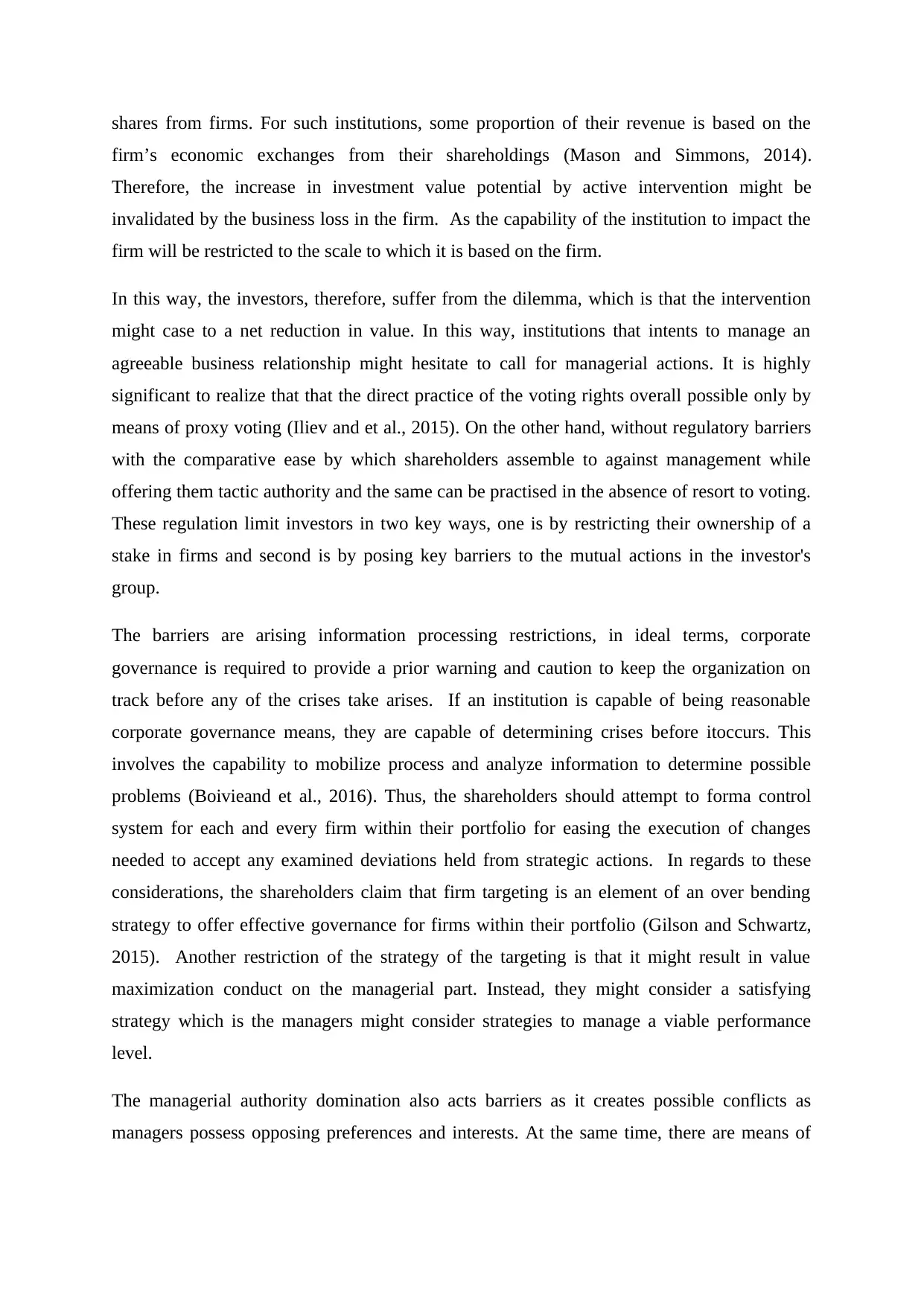
shares from firms. For such institutions, some proportion of their revenue is based on the
firm’s economic exchanges from their shareholdings (Mason and Simmons, 2014).
Therefore, the increase in investment value potential by active intervention might be
invalidated by the business loss in the firm. As the capability of the institution to impact the
firm will be restricted to the scale to which it is based on the firm.
In this way, the investors, therefore, suffer from the dilemma, which is that the intervention
might case to a net reduction in value. In this way, institutions that intents to manage an
agreeable business relationship might hesitate to call for managerial actions. It is highly
significant to realize that that the direct practice of the voting rights overall possible only by
means of proxy voting (Iliev and et al., 2015). On the other hand, without regulatory barriers
with the comparative ease by which shareholders assemble to against management while
offering them tactic authority and the same can be practised in the absence of resort to voting.
These regulation limit investors in two key ways, one is by restricting their ownership of a
stake in firms and second is by posing key barriers to the mutual actions in the investor's
group.
The barriers are arising information processing restrictions, in ideal terms, corporate
governance is required to provide a prior warning and caution to keep the organization on
track before any of the crises take arises. If an institution is capable of being reasonable
corporate governance means, they are capable of determining crises before itoccurs. This
involves the capability to mobilize process and analyze information to determine possible
problems (Boivieand et al., 2016). Thus, the shareholders should attempt to forma control
system for each and every firm within their portfolio for easing the execution of changes
needed to accept any examined deviations held from strategic actions. In regards to these
considerations, the shareholders claim that firm targeting is an element of an over bending
strategy to offer effective governance for firms within their portfolio (Gilson and Schwartz,
2015). Another restriction of the strategy of the targeting is that it might result in value
maximization conduct on the managerial part. Instead, they might consider a satisfying
strategy which is the managers might consider strategies to manage a viable performance
level.
The managerial authority domination also acts barriers as it creates possible conflicts as
managers possess opposing preferences and interests. At the same time, there are means of
firm’s economic exchanges from their shareholdings (Mason and Simmons, 2014).
Therefore, the increase in investment value potential by active intervention might be
invalidated by the business loss in the firm. As the capability of the institution to impact the
firm will be restricted to the scale to which it is based on the firm.
In this way, the investors, therefore, suffer from the dilemma, which is that the intervention
might case to a net reduction in value. In this way, institutions that intents to manage an
agreeable business relationship might hesitate to call for managerial actions. It is highly
significant to realize that that the direct practice of the voting rights overall possible only by
means of proxy voting (Iliev and et al., 2015). On the other hand, without regulatory barriers
with the comparative ease by which shareholders assemble to against management while
offering them tactic authority and the same can be practised in the absence of resort to voting.
These regulation limit investors in two key ways, one is by restricting their ownership of a
stake in firms and second is by posing key barriers to the mutual actions in the investor's
group.
The barriers are arising information processing restrictions, in ideal terms, corporate
governance is required to provide a prior warning and caution to keep the organization on
track before any of the crises take arises. If an institution is capable of being reasonable
corporate governance means, they are capable of determining crises before itoccurs. This
involves the capability to mobilize process and analyze information to determine possible
problems (Boivieand et al., 2016). Thus, the shareholders should attempt to forma control
system for each and every firm within their portfolio for easing the execution of changes
needed to accept any examined deviations held from strategic actions. In regards to these
considerations, the shareholders claim that firm targeting is an element of an over bending
strategy to offer effective governance for firms within their portfolio (Gilson and Schwartz,
2015). Another restriction of the strategy of the targeting is that it might result in value
maximization conduct on the managerial part. Instead, they might consider a satisfying
strategy which is the managers might consider strategies to manage a viable performance
level.
The managerial authority domination also acts barriers as it creates possible conflicts as
managers possess opposing preferences and interests. At the same time, there are means of
⊘ This is a preview!⊘
Do you want full access?
Subscribe today to unlock all pages.

Trusted by 1+ million students worldwide
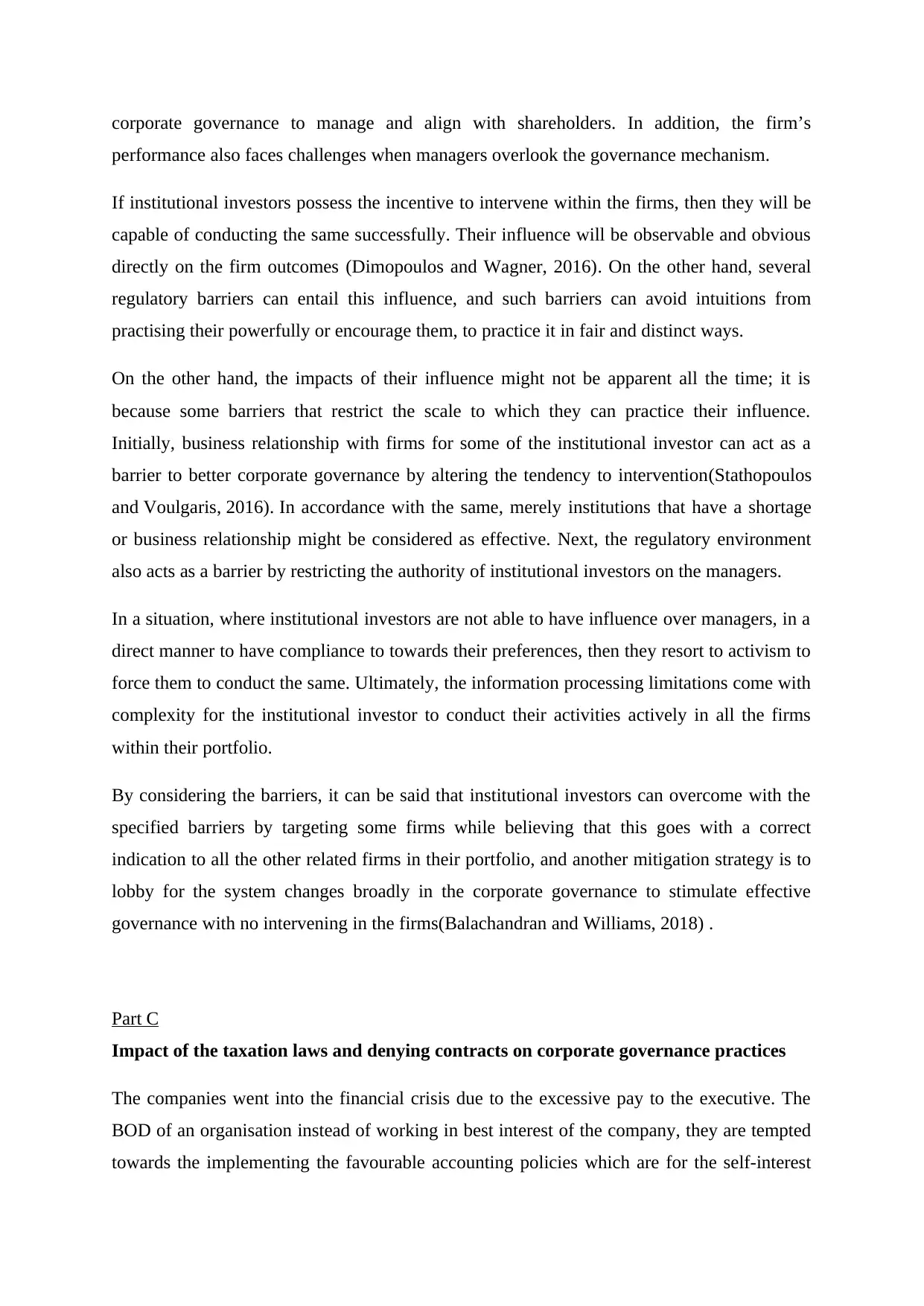
corporate governance to manage and align with shareholders. In addition, the firm’s
performance also faces challenges when managers overlook the governance mechanism.
If institutional investors possess the incentive to intervene within the firms, then they will be
capable of conducting the same successfully. Their influence will be observable and obvious
directly on the firm outcomes (Dimopoulos and Wagner, 2016). On the other hand, several
regulatory barriers can entail this influence, and such barriers can avoid intuitions from
practising their powerfully or encourage them, to practice it in fair and distinct ways.
On the other hand, the impacts of their influence might not be apparent all the time; it is
because some barriers that restrict the scale to which they can practice their influence.
Initially, business relationship with firms for some of the institutional investor can act as a
barrier to better corporate governance by altering the tendency to intervention(Stathopoulos
and Voulgaris, 2016). In accordance with the same, merely institutions that have a shortage
or business relationship might be considered as effective. Next, the regulatory environment
also acts as a barrier by restricting the authority of institutional investors on the managers.
In a situation, where institutional investors are not able to have influence over managers, in a
direct manner to have compliance to towards their preferences, then they resort to activism to
force them to conduct the same. Ultimately, the information processing limitations come with
complexity for the institutional investor to conduct their activities actively in all the firms
within their portfolio.
By considering the barriers, it can be said that institutional investors can overcome with the
specified barriers by targeting some firms while believing that this goes with a correct
indication to all the other related firms in their portfolio, and another mitigation strategy is to
lobby for the system changes broadly in the corporate governance to stimulate effective
governance with no intervening in the firms(Balachandran and Williams, 2018) .
Part C
Impact of the taxation laws and denying contracts on corporate governance practices
The companies went into the financial crisis due to the excessive pay to the executive. The
BOD of an organisation instead of working in best interest of the company, they are tempted
towards the implementing the favourable accounting policies which are for the self-interest
performance also faces challenges when managers overlook the governance mechanism.
If institutional investors possess the incentive to intervene within the firms, then they will be
capable of conducting the same successfully. Their influence will be observable and obvious
directly on the firm outcomes (Dimopoulos and Wagner, 2016). On the other hand, several
regulatory barriers can entail this influence, and such barriers can avoid intuitions from
practising their powerfully or encourage them, to practice it in fair and distinct ways.
On the other hand, the impacts of their influence might not be apparent all the time; it is
because some barriers that restrict the scale to which they can practice their influence.
Initially, business relationship with firms for some of the institutional investor can act as a
barrier to better corporate governance by altering the tendency to intervention(Stathopoulos
and Voulgaris, 2016). In accordance with the same, merely institutions that have a shortage
or business relationship might be considered as effective. Next, the regulatory environment
also acts as a barrier by restricting the authority of institutional investors on the managers.
In a situation, where institutional investors are not able to have influence over managers, in a
direct manner to have compliance to towards their preferences, then they resort to activism to
force them to conduct the same. Ultimately, the information processing limitations come with
complexity for the institutional investor to conduct their activities actively in all the firms
within their portfolio.
By considering the barriers, it can be said that institutional investors can overcome with the
specified barriers by targeting some firms while believing that this goes with a correct
indication to all the other related firms in their portfolio, and another mitigation strategy is to
lobby for the system changes broadly in the corporate governance to stimulate effective
governance with no intervening in the firms(Balachandran and Williams, 2018) .
Part C
Impact of the taxation laws and denying contracts on corporate governance practices
The companies went into the financial crisis due to the excessive pay to the executive. The
BOD of an organisation instead of working in best interest of the company, they are tempted
towards the implementing the favourable accounting policies which are for the self-interest
Paraphrase This Document
Need a fresh take? Get an instant paraphrase of this document with our AI Paraphraser
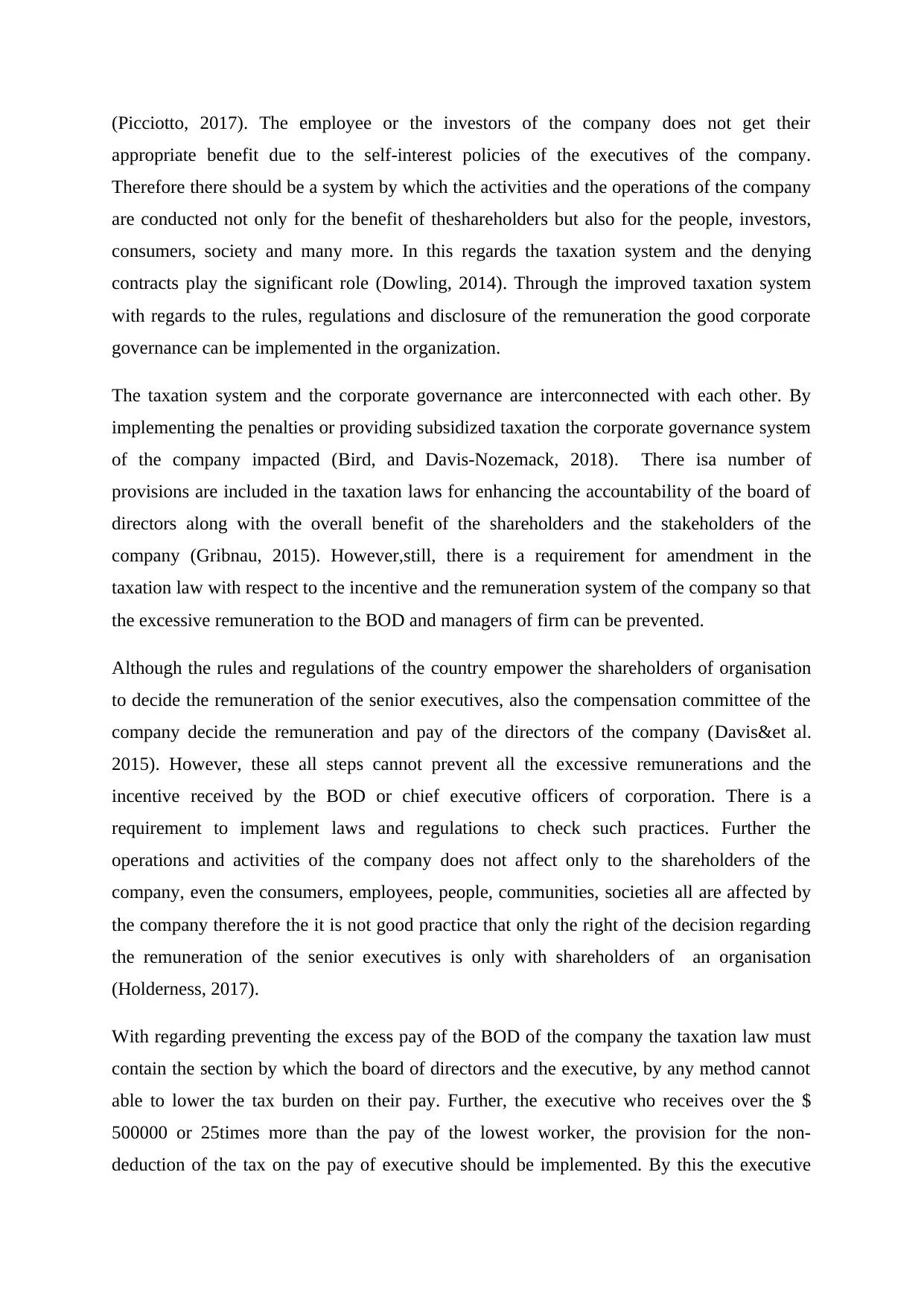
(Picciotto, 2017). The employee or the investors of the company does not get their
appropriate benefit due to the self-interest policies of the executives of the company.
Therefore there should be a system by which the activities and the operations of the company
are conducted not only for the benefit of theshareholders but also for the people, investors,
consumers, society and many more. In this regards the taxation system and the denying
contracts play the significant role (Dowling, 2014). Through the improved taxation system
with regards to the rules, regulations and disclosure of the remuneration the good corporate
governance can be implemented in the organization.
The taxation system and the corporate governance are interconnected with each other. By
implementing the penalties or providing subsidized taxation the corporate governance system
of the company impacted (Bird, and Davis-Nozemack, 2018). There isa number of
provisions are included in the taxation laws for enhancing the accountability of the board of
directors along with the overall benefit of the shareholders and the stakeholders of the
company (Gribnau, 2015). However,still, there is a requirement for amendment in the
taxation law with respect to the incentive and the remuneration system of the company so that
the excessive remuneration to the BOD and managers of firm can be prevented.
Although the rules and regulations of the country empower the shareholders of organisation
to decide the remuneration of the senior executives, also the compensation committee of the
company decide the remuneration and pay of the directors of the company (Davis&et al.
2015). However, these all steps cannot prevent all the excessive remunerations and the
incentive received by the BOD or chief executive officers of corporation. There is a
requirement to implement laws and regulations to check such practices. Further the
operations and activities of the company does not affect only to the shareholders of the
company, even the consumers, employees, people, communities, societies all are affected by
the company therefore the it is not good practice that only the right of the decision regarding
the remuneration of the senior executives is only with shareholders of an organisation
(Holderness, 2017).
With regarding preventing the excess pay of the BOD of the company the taxation law must
contain the section by which the board of directors and the executive, by any method cannot
able to lower the tax burden on their pay. Further, the executive who receives over the $
500000 or 25times more than the pay of the lowest worker, the provision for the non-
deduction of the tax on the pay of executive should be implemented. By this the executive
appropriate benefit due to the self-interest policies of the executives of the company.
Therefore there should be a system by which the activities and the operations of the company
are conducted not only for the benefit of theshareholders but also for the people, investors,
consumers, society and many more. In this regards the taxation system and the denying
contracts play the significant role (Dowling, 2014). Through the improved taxation system
with regards to the rules, regulations and disclosure of the remuneration the good corporate
governance can be implemented in the organization.
The taxation system and the corporate governance are interconnected with each other. By
implementing the penalties or providing subsidized taxation the corporate governance system
of the company impacted (Bird, and Davis-Nozemack, 2018). There isa number of
provisions are included in the taxation laws for enhancing the accountability of the board of
directors along with the overall benefit of the shareholders and the stakeholders of the
company (Gribnau, 2015). However,still, there is a requirement for amendment in the
taxation law with respect to the incentive and the remuneration system of the company so that
the excessive remuneration to the BOD and managers of firm can be prevented.
Although the rules and regulations of the country empower the shareholders of organisation
to decide the remuneration of the senior executives, also the compensation committee of the
company decide the remuneration and pay of the directors of the company (Davis&et al.
2015). However, these all steps cannot prevent all the excessive remunerations and the
incentive received by the BOD or chief executive officers of corporation. There is a
requirement to implement laws and regulations to check such practices. Further the
operations and activities of the company does not affect only to the shareholders of the
company, even the consumers, employees, people, communities, societies all are affected by
the company therefore the it is not good practice that only the right of the decision regarding
the remuneration of the senior executives is only with shareholders of an organisation
(Holderness, 2017).
With regarding preventing the excess pay of the BOD of the company the taxation law must
contain the section by which the board of directors and the executive, by any method cannot
able to lower the tax burden on their pay. Further, the executive who receives over the $
500000 or 25times more than the pay of the lowest worker, the provision for the non-
deduction of the tax on the pay of executive should be implemented. By this the executive
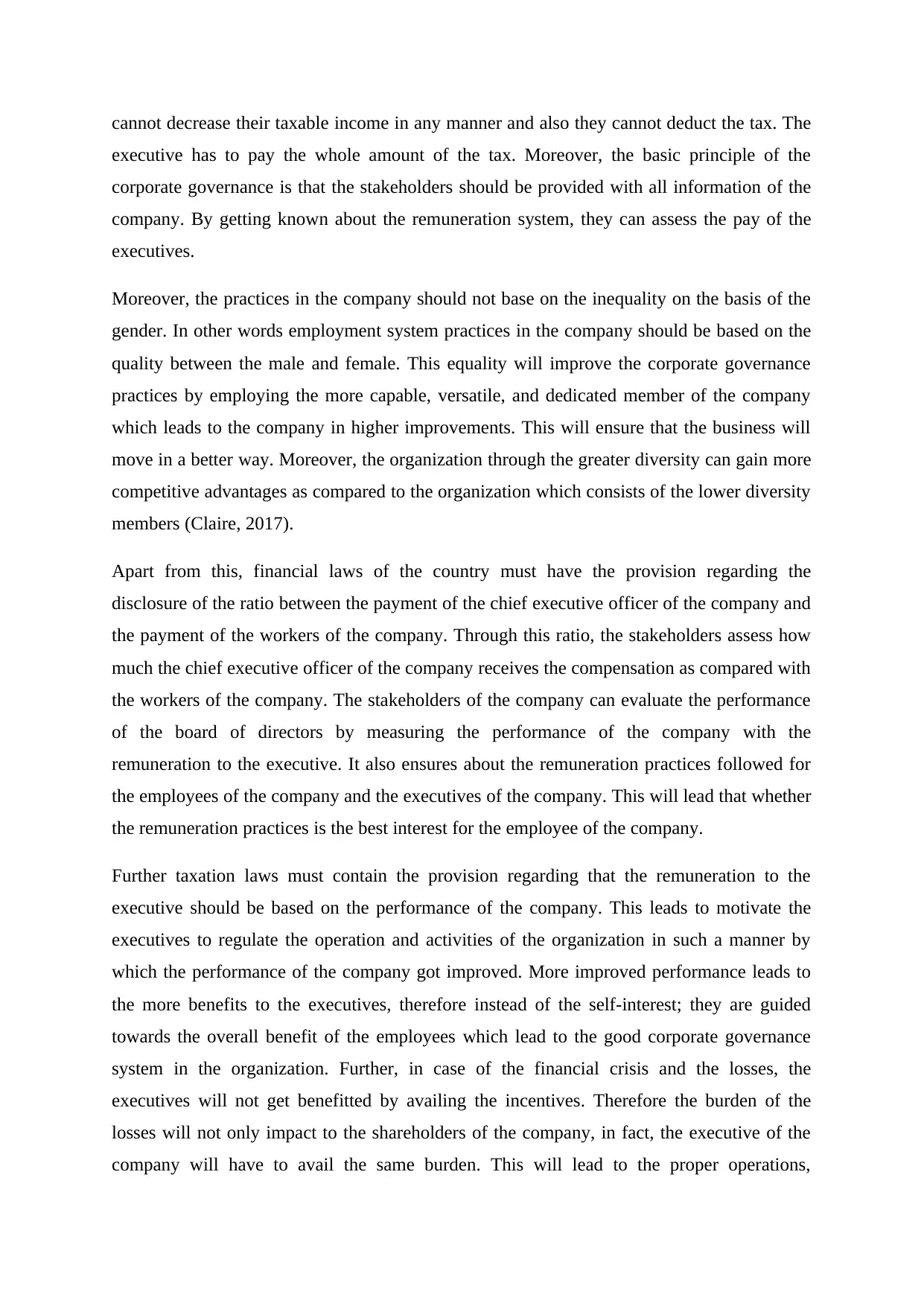
cannot decrease their taxable income in any manner and also they cannot deduct the tax. The
executive has to pay the whole amount of the tax. Moreover, the basic principle of the
corporate governance is that the stakeholders should be provided with all information of the
company. By getting known about the remuneration system, they can assess the pay of the
executives.
Moreover, the practices in the company should not base on the inequality on the basis of the
gender. In other words employment system practices in the company should be based on the
quality between the male and female. This equality will improve the corporate governance
practices by employing the more capable, versatile, and dedicated member of the company
which leads to the company in higher improvements. This will ensure that the business will
move in a better way. Moreover, the organization through the greater diversity can gain more
competitive advantages as compared to the organization which consists of the lower diversity
members (Claire, 2017).
Apart from this, financial laws of the country must have the provision regarding the
disclosure of the ratio between the payment of the chief executive officer of the company and
the payment of the workers of the company. Through this ratio, the stakeholders assess how
much the chief executive officer of the company receives the compensation as compared with
the workers of the company. The stakeholders of the company can evaluate the performance
of the board of directors by measuring the performance of the company with the
remuneration to the executive. It also ensures about the remuneration practices followed for
the employees of the company and the executives of the company. This will lead that whether
the remuneration practices is the best interest for the employee of the company.
Further taxation laws must contain the provision regarding that the remuneration to the
executive should be based on the performance of the company. This leads to motivate the
executives to regulate the operation and activities of the organization in such a manner by
which the performance of the company got improved. More improved performance leads to
the more benefits to the executives, therefore instead of the self-interest; they are guided
towards the overall benefit of the employees which lead to the good corporate governance
system in the organization. Further, in case of the financial crisis and the losses, the
executives will not get benefitted by availing the incentives. Therefore the burden of the
losses will not only impact to the shareholders of the company, in fact, the executive of the
company will have to avail the same burden. This will lead to the proper operations,
executive has to pay the whole amount of the tax. Moreover, the basic principle of the
corporate governance is that the stakeholders should be provided with all information of the
company. By getting known about the remuneration system, they can assess the pay of the
executives.
Moreover, the practices in the company should not base on the inequality on the basis of the
gender. In other words employment system practices in the company should be based on the
quality between the male and female. This equality will improve the corporate governance
practices by employing the more capable, versatile, and dedicated member of the company
which leads to the company in higher improvements. This will ensure that the business will
move in a better way. Moreover, the organization through the greater diversity can gain more
competitive advantages as compared to the organization which consists of the lower diversity
members (Claire, 2017).
Apart from this, financial laws of the country must have the provision regarding the
disclosure of the ratio between the payment of the chief executive officer of the company and
the payment of the workers of the company. Through this ratio, the stakeholders assess how
much the chief executive officer of the company receives the compensation as compared with
the workers of the company. The stakeholders of the company can evaluate the performance
of the board of directors by measuring the performance of the company with the
remuneration to the executive. It also ensures about the remuneration practices followed for
the employees of the company and the executives of the company. This will lead that whether
the remuneration practices is the best interest for the employee of the company.
Further taxation laws must contain the provision regarding that the remuneration to the
executive should be based on the performance of the company. This leads to motivate the
executives to regulate the operation and activities of the organization in such a manner by
which the performance of the company got improved. More improved performance leads to
the more benefits to the executives, therefore instead of the self-interest; they are guided
towards the overall benefit of the employees which lead to the good corporate governance
system in the organization. Further, in case of the financial crisis and the losses, the
executives will not get benefitted by availing the incentives. Therefore the burden of the
losses will not only impact to the shareholders of the company, in fact, the executive of the
company will have to avail the same burden. This will lead to the proper operations,
⊘ This is a preview!⊘
Do you want full access?
Subscribe today to unlock all pages.

Trusted by 1+ million students worldwide
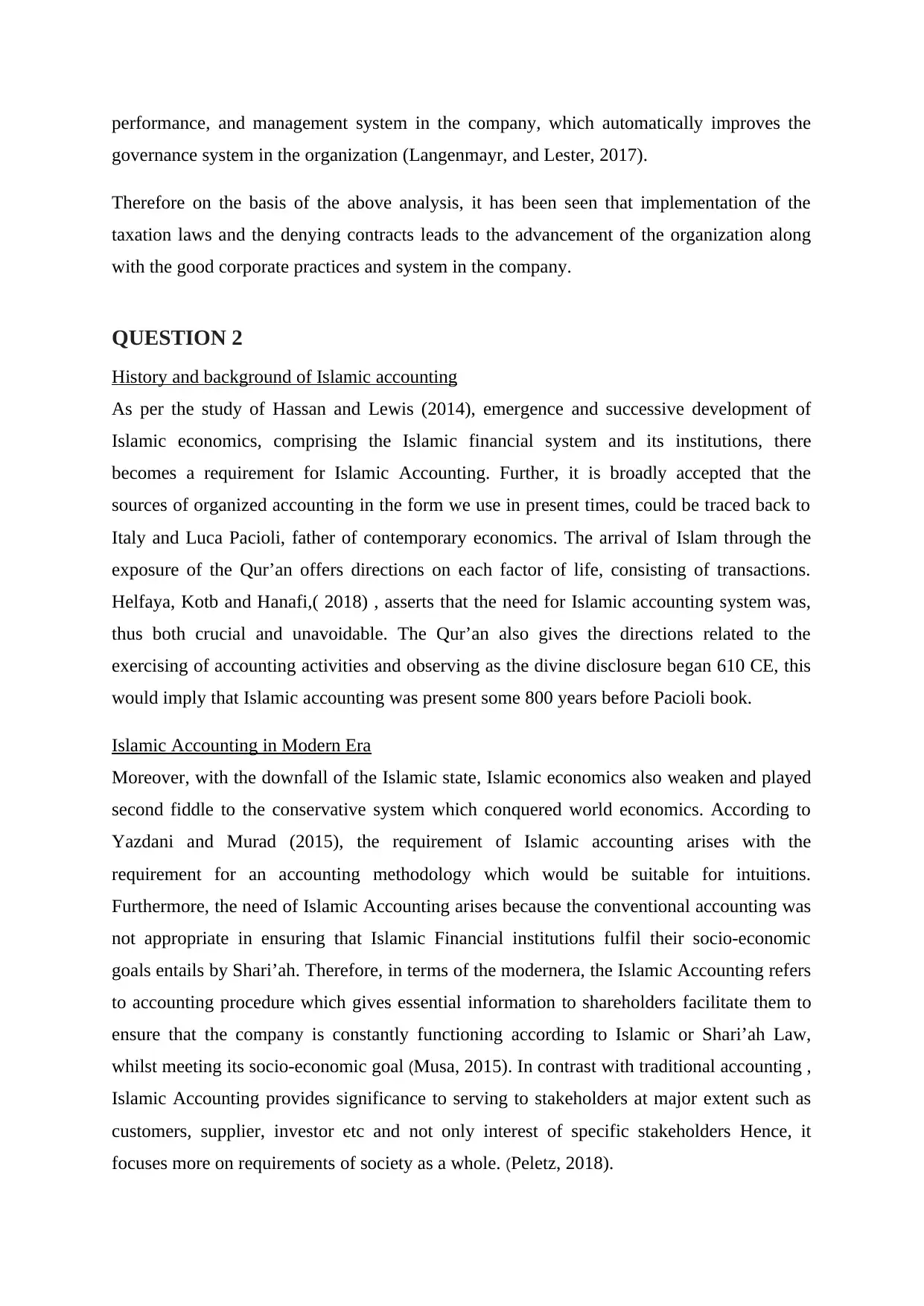
performance, and management system in the company, which automatically improves the
governance system in the organization (Langenmayr, and Lester, 2017).
Therefore on the basis of the above analysis, it has been seen that implementation of the
taxation laws and the denying contracts leads to the advancement of the organization along
with the good corporate practices and system in the company.
QUESTION 2
History and background of Islamic accounting
As per the study of Hassan and Lewis (2014), emergence and successive development of
Islamic economics, comprising the Islamic financial system and its institutions, there
becomes a requirement for Islamic Accounting. Further, it is broadly accepted that the
sources of organized accounting in the form we use in present times, could be traced back to
Italy and Luca Pacioli, father of contemporary economics. The arrival of Islam through the
exposure of the Qur’an offers directions on each factor of life, consisting of transactions.
Helfaya, Kotb and Hanafi,( 2018) , asserts that the need for Islamic accounting system was,
thus both crucial and unavoidable. The Qur’an also gives the directions related to the
exercising of accounting activities and observing as the divine disclosure began 610 CE, this
would imply that Islamic accounting was present some 800 years before Pacioli book.
Islamic Accounting in Modern Era
Moreover, with the downfall of the Islamic state, Islamic economics also weaken and played
second fiddle to the conservative system which conquered world economics. According to
Yazdani and Murad (2015), the requirement of Islamic accounting arises with the
requirement for an accounting methodology which would be suitable for intuitions.
Furthermore, the need of Islamic Accounting arises because the conventional accounting was
not appropriate in ensuring that Islamic Financial institutions fulfil their socio-economic
goals entails by Shari’ah. Therefore, in terms of the modernera, the Islamic Accounting refers
to accounting procedure which gives essential information to shareholders facilitate them to
ensure that the company is constantly functioning according to Islamic or Shari’ah Law,
whilst meeting its socio-economic goal (Musa, 2015). In contrast with traditional accounting ,
Islamic Accounting provides significance to serving to stakeholders at major extent such as
customers, supplier, investor etc and not only interest of specific stakeholders Hence, it
focuses more on requirements of society as a whole. (Peletz, 2018).
governance system in the organization (Langenmayr, and Lester, 2017).
Therefore on the basis of the above analysis, it has been seen that implementation of the
taxation laws and the denying contracts leads to the advancement of the organization along
with the good corporate practices and system in the company.
QUESTION 2
History and background of Islamic accounting
As per the study of Hassan and Lewis (2014), emergence and successive development of
Islamic economics, comprising the Islamic financial system and its institutions, there
becomes a requirement for Islamic Accounting. Further, it is broadly accepted that the
sources of organized accounting in the form we use in present times, could be traced back to
Italy and Luca Pacioli, father of contemporary economics. The arrival of Islam through the
exposure of the Qur’an offers directions on each factor of life, consisting of transactions.
Helfaya, Kotb and Hanafi,( 2018) , asserts that the need for Islamic accounting system was,
thus both crucial and unavoidable. The Qur’an also gives the directions related to the
exercising of accounting activities and observing as the divine disclosure began 610 CE, this
would imply that Islamic accounting was present some 800 years before Pacioli book.
Islamic Accounting in Modern Era
Moreover, with the downfall of the Islamic state, Islamic economics also weaken and played
second fiddle to the conservative system which conquered world economics. According to
Yazdani and Murad (2015), the requirement of Islamic accounting arises with the
requirement for an accounting methodology which would be suitable for intuitions.
Furthermore, the need of Islamic Accounting arises because the conventional accounting was
not appropriate in ensuring that Islamic Financial institutions fulfil their socio-economic
goals entails by Shari’ah. Therefore, in terms of the modernera, the Islamic Accounting refers
to accounting procedure which gives essential information to shareholders facilitate them to
ensure that the company is constantly functioning according to Islamic or Shari’ah Law,
whilst meeting its socio-economic goal (Musa, 2015). In contrast with traditional accounting ,
Islamic Accounting provides significance to serving to stakeholders at major extent such as
customers, supplier, investor etc and not only interest of specific stakeholders Hence, it
focuses more on requirements of society as a whole. (Peletz, 2018).
Paraphrase This Document
Need a fresh take? Get an instant paraphrase of this document with our AI Paraphraser
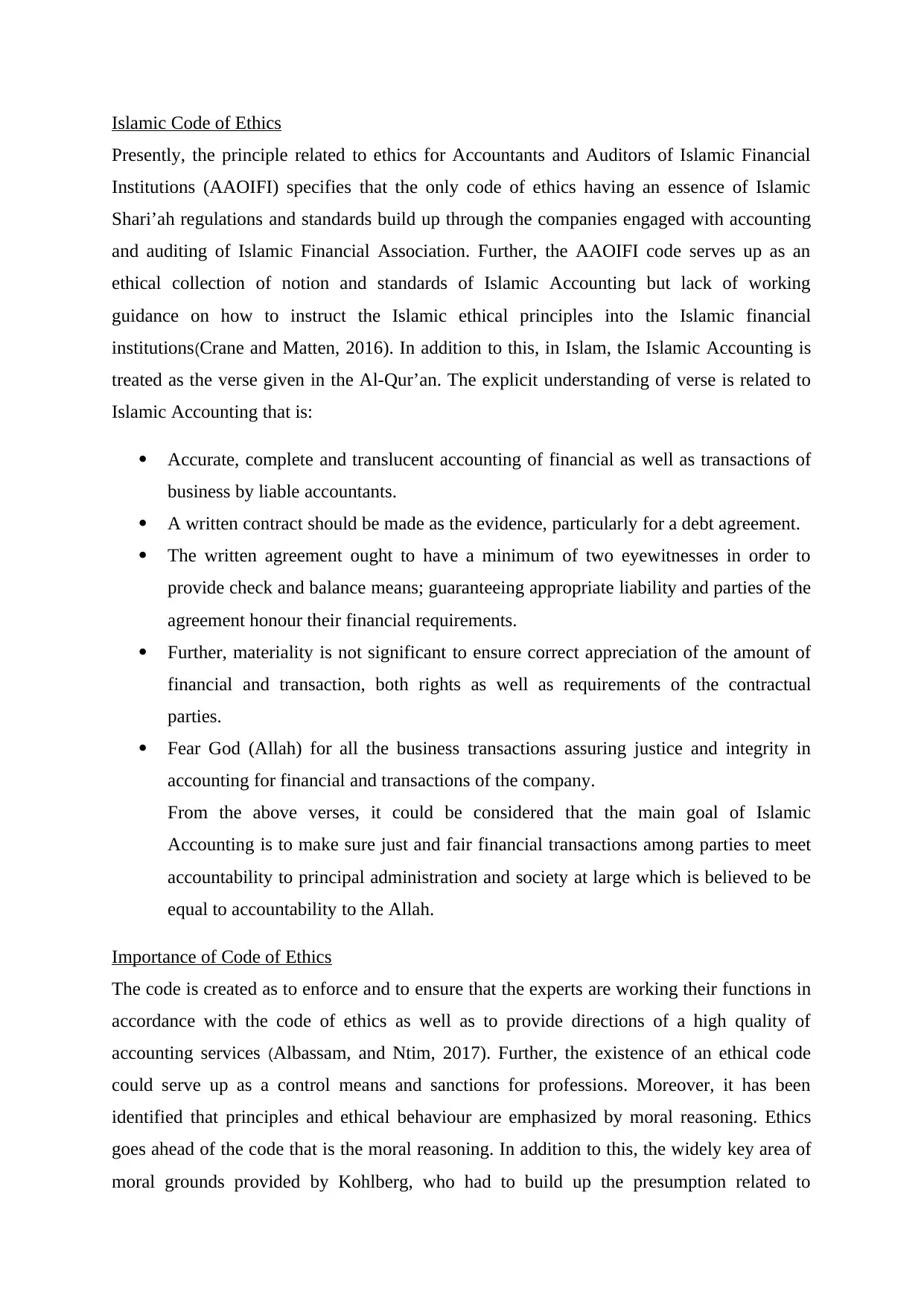
Islamic Code of Ethics
Presently, the principle related to ethics for Accountants and Auditors of Islamic Financial
Institutions (AAOIFI) specifies that the only code of ethics having an essence of Islamic
Shari’ah regulations and standards build up through the companies engaged with accounting
and auditing of Islamic Financial Association. Further, the AAOIFI code serves up as an
ethical collection of notion and standards of Islamic Accounting but lack of working
guidance on how to instruct the Islamic ethical principles into the Islamic financial
institutions(Crane and Matten, 2016). In addition to this, in Islam, the Islamic Accounting is
treated as the verse given in the Al-Qur’an. The explicit understanding of verse is related to
Islamic Accounting that is:
Accurate, complete and translucent accounting of financial as well as transactions of
business by liable accountants.
A written contract should be made as the evidence, particularly for a debt agreement.
The written agreement ought to have a minimum of two eyewitnesses in order to
provide check and balance means; guaranteeing appropriate liability and parties of the
agreement honour their financial requirements.
Further, materiality is not significant to ensure correct appreciation of the amount of
financial and transaction, both rights as well as requirements of the contractual
parties.
Fear God (Allah) for all the business transactions assuring justice and integrity in
accounting for financial and transactions of the company.
From the above verses, it could be considered that the main goal of Islamic
Accounting is to make sure just and fair financial transactions among parties to meet
accountability to principal administration and society at large which is believed to be
equal to accountability to the Allah.
Importance of Code of Ethics
The code is created as to enforce and to ensure that the experts are working their functions in
accordance with the code of ethics as well as to provide directions of a high quality of
accounting services (Albassam, and Ntim, 2017). Further, the existence of an ethical code
could serve up as a control means and sanctions for professions. Moreover, it has been
identified that principles and ethical behaviour are emphasized by moral reasoning. Ethics
goes ahead of the code that is the moral reasoning. In addition to this, the widely key area of
moral grounds provided by Kohlberg, who had to build up the presumption related to
Presently, the principle related to ethics for Accountants and Auditors of Islamic Financial
Institutions (AAOIFI) specifies that the only code of ethics having an essence of Islamic
Shari’ah regulations and standards build up through the companies engaged with accounting
and auditing of Islamic Financial Association. Further, the AAOIFI code serves up as an
ethical collection of notion and standards of Islamic Accounting but lack of working
guidance on how to instruct the Islamic ethical principles into the Islamic financial
institutions(Crane and Matten, 2016). In addition to this, in Islam, the Islamic Accounting is
treated as the verse given in the Al-Qur’an. The explicit understanding of verse is related to
Islamic Accounting that is:
Accurate, complete and translucent accounting of financial as well as transactions of
business by liable accountants.
A written contract should be made as the evidence, particularly for a debt agreement.
The written agreement ought to have a minimum of two eyewitnesses in order to
provide check and balance means; guaranteeing appropriate liability and parties of the
agreement honour their financial requirements.
Further, materiality is not significant to ensure correct appreciation of the amount of
financial and transaction, both rights as well as requirements of the contractual
parties.
Fear God (Allah) for all the business transactions assuring justice and integrity in
accounting for financial and transactions of the company.
From the above verses, it could be considered that the main goal of Islamic
Accounting is to make sure just and fair financial transactions among parties to meet
accountability to principal administration and society at large which is believed to be
equal to accountability to the Allah.
Importance of Code of Ethics
The code is created as to enforce and to ensure that the experts are working their functions in
accordance with the code of ethics as well as to provide directions of a high quality of
accounting services (Albassam, and Ntim, 2017). Further, the existence of an ethical code
could serve up as a control means and sanctions for professions. Moreover, it has been
identified that principles and ethical behaviour are emphasized by moral reasoning. Ethics
goes ahead of the code that is the moral reasoning. In addition to this, the widely key area of
moral grounds provided by Kohlberg, who had to build up the presumption related to
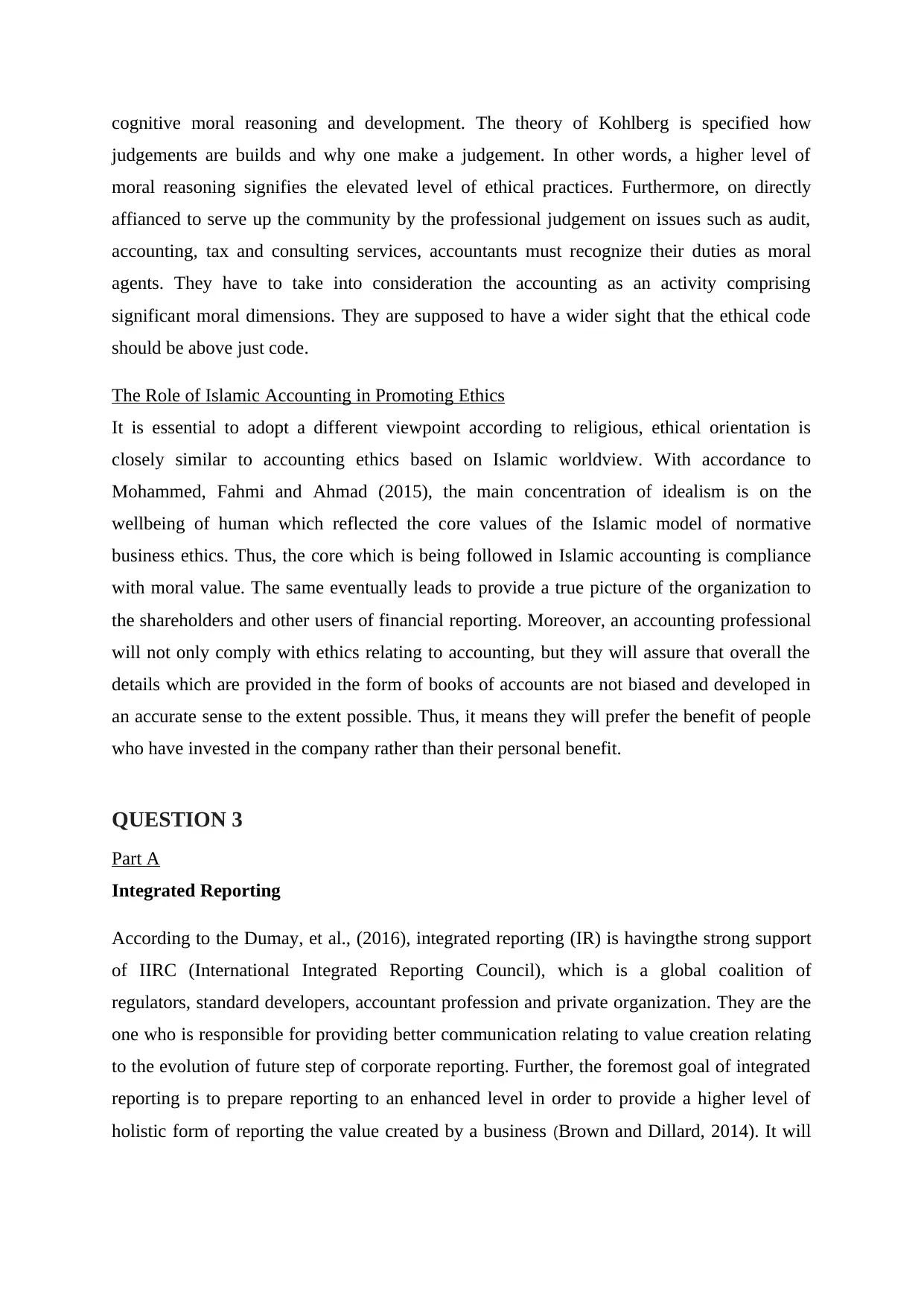
cognitive moral reasoning and development. The theory of Kohlberg is specified how
judgements are builds and why one make a judgement. In other words, a higher level of
moral reasoning signifies the elevated level of ethical practices. Furthermore, on directly
affianced to serve up the community by the professional judgement on issues such as audit,
accounting, tax and consulting services, accountants must recognize their duties as moral
agents. They have to take into consideration the accounting as an activity comprising
significant moral dimensions. They are supposed to have a wider sight that the ethical code
should be above just code.
The Role of Islamic Accounting in Promoting Ethics
It is essential to adopt a different viewpoint according to religious, ethical orientation is
closely similar to accounting ethics based on Islamic worldview. With accordance to
Mohammed, Fahmi and Ahmad (2015), the main concentration of idealism is on the
wellbeing of human which reflected the core values of the Islamic model of normative
business ethics. Thus, the core which is being followed in Islamic accounting is compliance
with moral value. The same eventually leads to provide a true picture of the organization to
the shareholders and other users of financial reporting. Moreover, an accounting professional
will not only comply with ethics relating to accounting, but they will assure that overall the
details which are provided in the form of books of accounts are not biased and developed in
an accurate sense to the extent possible. Thus, it means they will prefer the benefit of people
who have invested in the company rather than their personal benefit.
QUESTION 3
Part A
Integrated Reporting
According to the Dumay, et al., (2016), integrated reporting (IR) is havingthe strong support
of IIRC (International Integrated Reporting Council), which is a global coalition of
regulators, standard developers, accountant profession and private organization. They are the
one who is responsible for providing better communication relating to value creation relating
to the evolution of future step of corporate reporting. Further, the foremost goal of integrated
reporting is to prepare reporting to an enhanced level in order to provide a higher level of
holistic form of reporting the value created by a business (Brown and Dillard, 2014). It will
judgements are builds and why one make a judgement. In other words, a higher level of
moral reasoning signifies the elevated level of ethical practices. Furthermore, on directly
affianced to serve up the community by the professional judgement on issues such as audit,
accounting, tax and consulting services, accountants must recognize their duties as moral
agents. They have to take into consideration the accounting as an activity comprising
significant moral dimensions. They are supposed to have a wider sight that the ethical code
should be above just code.
The Role of Islamic Accounting in Promoting Ethics
It is essential to adopt a different viewpoint according to religious, ethical orientation is
closely similar to accounting ethics based on Islamic worldview. With accordance to
Mohammed, Fahmi and Ahmad (2015), the main concentration of idealism is on the
wellbeing of human which reflected the core values of the Islamic model of normative
business ethics. Thus, the core which is being followed in Islamic accounting is compliance
with moral value. The same eventually leads to provide a true picture of the organization to
the shareholders and other users of financial reporting. Moreover, an accounting professional
will not only comply with ethics relating to accounting, but they will assure that overall the
details which are provided in the form of books of accounts are not biased and developed in
an accurate sense to the extent possible. Thus, it means they will prefer the benefit of people
who have invested in the company rather than their personal benefit.
QUESTION 3
Part A
Integrated Reporting
According to the Dumay, et al., (2016), integrated reporting (IR) is havingthe strong support
of IIRC (International Integrated Reporting Council), which is a global coalition of
regulators, standard developers, accountant profession and private organization. They are the
one who is responsible for providing better communication relating to value creation relating
to the evolution of future step of corporate reporting. Further, the foremost goal of integrated
reporting is to prepare reporting to an enhanced level in order to provide a higher level of
holistic form of reporting the value created by a business (Brown and Dillard, 2014). It will
⊘ This is a preview!⊘
Do you want full access?
Subscribe today to unlock all pages.

Trusted by 1+ million students worldwide
1 out of 27
Related Documents
Your All-in-One AI-Powered Toolkit for Academic Success.
+13062052269
info@desklib.com
Available 24*7 on WhatsApp / Email
![[object Object]](/_next/static/media/star-bottom.7253800d.svg)
Unlock your academic potential
Copyright © 2020–2026 A2Z Services. All Rights Reserved. Developed and managed by ZUCOL.





